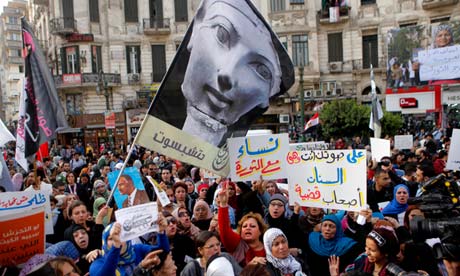 Egypt's Muslim Brotherhood have claimed that a UN declaration calling for an end to violence against women will lead to the "complete disintegration of society".
Egypt's Muslim Brotherhood have claimed that a UN declaration calling for an end to violence against women will lead to the "complete disintegration of society".Delegates at the UN's Commission on the Status of Women (CSW) in New York have spent the last fortnight debating the wording of a declaration that would condemn violence against women. The brotherhood, whose close allies control Egypt's parliament and presidency, slated the declaration in an online statement on Thursday – calling it a decadent and destructive document that undermined Islamic ethics by calling for women to work, travel and use contraception without their husbands' permission.
In a 10-point memorandum, the brotherhood also criticised the declaration for granting women sexual freedom, allowing Muslim women to marry non-Muslims, granting equal rights to homosexual people, and allowing wives full legal rights to take their husbands to court for marital rape.
"This declaration, if ratified, would lead to complete disintegration of society, and would certainly be the final step in the intellectual and cultural invasion of Muslim countries, eliminating the moral specificity that helps preserve cohesion of Islamic societies," the brotherhood 's statement claimed.
The remarks drew a furious response inside Egypt. Soad Shalaby, a spokesperson for Egypt's National Council for Women, said: "How would this declaration lead to a disintegration of society? On the contrary, it will lead to women's integration within society."
Shalaby said it was disingenuous to use Islam to justify the erosion of women's rights. "It is only a misinterpretation of Islam that creates these kinds of statements," she said. "It goes without saying that Islam never encourages violence against women. On the contrary, it gives them rights." She said she thought the brotherhood's outburst was not a fair reflection of the views of many within the Muslim Sisterhood, the brotherhood's female division – let alone the Middle East.
"We're asking them to stop using religion and culture to undermine negotiations and to justify violence against women," said Lynn Darwich, a spokesperson for the Coalition for Sexual and Bodily Rights in Muslim Societies, who is attending the conference in New York.
The brotherhood's statement is also likely to have divided Egypt's delegation at the Commission on the Status of Women, which contains both conservative and liberal members. "On the whole, they have been quiet because of internal divisions within the delegation," said Darwich.
The brotherhood is not the only group to have voiced objections to the UN charter, which has been the subject of bitter debate. Countries such as the Vatican, Pakistan, Iran, Syria and Russia have led the conservative response.
A spokesman for Mohamed Morsi, Egypt's Islamist president who comes from the political wing of the Muslim Brotherhood, attempted to distance himself from the brotherhood's statement, saying he was no longer a member of the organisation. But in an interview with the New York Times, Pakinam al-Sharkawy also appeared to side with some of the brotherhood's arguments, claiming that marital rape was a western rather than Egyptian problem.
Darwich said her remarks showed the Egyptian government was still failing to take women's rights seriously. "This denial that these issues are not ours will make the situation worse," she said. "We need Arab governments to recognise that these are not foreign issues."
Women rights are the subject of an continuing national debate in Egypt: at least 25 women were sexually assaulted in Tahrir Square during recent protests – in what some campaigners claim is a systematic attempt to stop women from protesting.
But the problem goes far beyond Tahrir Square.
According to a 2008 survey by the Egyptian Center for Women's Rights, 83% of Egyptian women have been sexually harassed in their lifetime – while the assault of street children goes widely unreported. Female genital mutilation was banned in 2008, but according to some surveys, up to 90% of Egyptian women may have been subjected to the practice.
The fall of Hosni Mubarak two years ago was supposed to be a turning point for women's rights – but for many campaigners, Egypt has since regressed. The country's new constitution does not safeguard the rights of women, while a quota for women in parliament has been rescinded, meaning that just 2% of MPs elected in 2012 were female – down from 12% in 2010.
"There is a trend that limits the role of women," said Shalaby. "They are trying to make us lose whatever gains we got from the revolution."
• This article was amended on 16 March 2013 to correct the spelling of Lynn Darwich's name. A quote was also corrected. In the original version Darwich was quoted as saying: "We need Egyptians to realise that these are not foreign issues."



